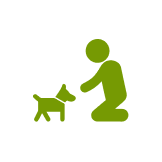In 24 cities

How Can I Get My Reluctant Dog Moving? Practical Tips for Boosting High-Intensity Activity
|
|
Time to read 2 min
Get product availability and delivery timelines based on your location.
No saved addresses found
Add an address to see it hereAre you sure you want to delete this address?
100% Authentic

Easy return policy

Help us ensure a smooth delivery
SIZE GUIDE
Written by: Dr. Shantanu Kalambi
|
|
Time to read 2 min
As veterinarians committed to promoting the health and happiness of our canine companions, we are excited to tackle a common concern among pet parents: How can I encourage my reluctant dog to engage in high-intensity activity? Join me as we explore practical tips and creative solutions to help your furry friend embrace a more active lifestyle, tailored to their unique needs and preferences.
Getting a reluctant dog moving may seem like a daunting task, but with patience, persistence, and a touch of creativity, it's entirely possible. Let's dive into some effective strategies to boost high-intensity activity levels in dogs who may be hesitant or unable to participate in vigorous exercise:
Begin by introducing low-impact activities, such as brisk walks or gentle games of fetch, to ease your dog into the idea of exercise.
Gradually increase the intensity and duration of activities over time as your dog gains confidence and stamina.
Incorporate interactive toys, agility courses, or obstacle courses to make exercise sessions more enjoyable and stimulating for your dog.
Experiment with different activities to find what sparks your dog's interest and keeps them motivated to move.
Explore alternative forms of high-intensity activity that cater to your dog's individual needs and preferences. This could include activities such as swimming, hiking, or canine sports like agility or flyball.
Tailor activities to suit your dog's abilities and limitations, ensuring they can participate safely and comfortably.
Utilize positive reinforcement techniques, such as praise, treats, or favorite toys, to reward and encourage your dog's efforts during exercise.
Create a positive association with physical activity by making it a rewarding and enjoyable experience for your furry companion.
Consult with your veterinarian or a certified canine fitness trainer for personalized recommendations and guidance on suitable forms of exercise for your dog.
They can provide valuable insights and assistance in designing a tailored exercise plan that meets your dog's specific needs and goals.
Encouraging and increasing high-intensity activity in reluctant dogs is not only beneficial for their physical health but also enhances their mental well-being and overall quality of life. By finding creative solutions and alternative forms of exercise that resonate with your dog, you can help them embrace a more active and fulfilling lifestyle.
Remember, every step towards a more active lifestyle is a step towards a healthier, happier dog. Together, let's embark on this journey of discovery and empowerment, ensuring that every dog can enjoy the benefits of high-intensity activity, tailored to their unique needs and preferences.



In 24 cities

Happy pet parents

For every new member

Exclusive
2 item in cart
₹10,360




